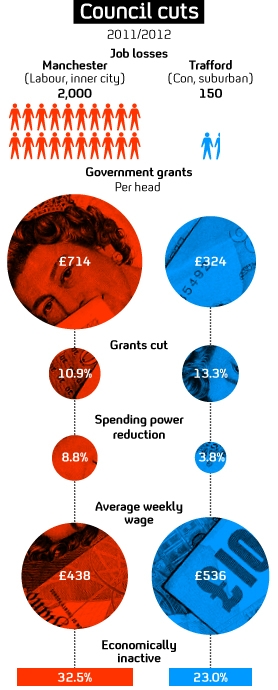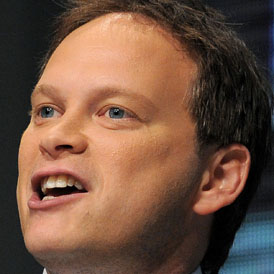Minister admits poorest areas will be hardest hit by cuts
In an exclusive interview with Channel 4 News, Housing Minister Grant Shapps has conceded that the poorest local authorities will suffer the most under Government spending cuts.

Housing Minister, Grant Shapps, has told Channel 4 News that the most deprived areas in England and Wales will inevitably face the biggest reductions in their spending power.
He said: “If you are entirely reliant, or largely reliant, on central government, then of course when central government is having to make cuts because we don’t want the country to go bust, of course those are the areas who end up seeing the biggest reduction in spending.”
The admission seemingly undermines previous statements by Mr Shapps – who called the Government’s settlement of local government funding “fair and progressive” when details were revealed in December last year.
The Communities and Local Government Secretary, Eric Pickles, insisted: “I have sought to achieve a fair and sustainable settlement for local government. This will be a progressive settlement and fair between different parts of the country.”
Ministers say they have made bigger reductions in central Government funding to wealthier areas.
But they have always resisted the suggestion that the historical bias of local authority funding, where poorer areas get more money from Whitehall, makes the current settlement unfair.
Figures for “revenue spending power” – which include council tax – show that more deprived urban councils like Manchester and Liverpool are facing cuts of 8.8 per cent, double the national average.
Of the top 10 councils hardest hit, all are urban unitary authorities, eight controlled by Labour.
The ten local authorities at the bottom of the league tables for revenue spending power are all Conservative-controlled and seven of them are county councils.
In Manchester, where less than a quarter of total income comes from council tax, the spending power cut is more than double that of neighbouring Conservative-run authority Trafford, a suburb where more than half the council’s resources are raised locally.
The leader of Labour-controlled Manchester council, Richard Leese, told Channel 4 News: “More affluent areas like Trafford are far less dependent on central Government grant than more deprived areas like Manchester.
“Also, places like Manchester used to get a large number of additional grants targeted at deprivation and all those grants have been cut completely as a result of the actions of this government.”
Read more - FactCheck: Manchester - front line in the cuts blame game
Mr Shapps said: “The population has its needs and requirements, and as a result, the population gets a huge chunk of money from central Government.”
Asked whether he thought that was wrong, Mr Shapps said: “No. We have gone to extraordinary lengths to try to put mechanisms in place to make sure that areas that are most dependent on central Government are protected the most from reductions.”
The Government gave councils facing the biggest spending power cuts a transition grant to cap the overall reduction at a maximum of 8.8 per cent.
Mr Shapps added: “The truth is that the Government, because we wanted to protect the most vulnerable, unlike what Manchester City Council is itself doing, where they’re slashing and burning those services for local people, has gone to extraordinary lengths, never before seen at a time when Government is making the settlements to councils.”
Mr Shapps said the cuts in services announced by Manchester City Council “are disproportionate to the reduction in the money that they’re getting from Government.

“That’s really unfair on local people. I think they are almost taking the cuts out on the most vulnerable in Manchester. That’s completely wrong and I call on them to take another look at this.”
Mr Shapps says council chiefs are making budget cuts of 25 per cent over two years, but they only face a cut in spending power of 15.5 per cent over the same period.
A spokesman for Manchester council said the Government’s figure for spending power was “hypothetical” and failed to take into account the real pressures on the authority’s budget.
She told Channel 4 News: “The 15.5 per cent figure that the Government is citing is in spending power, which is a combination of government grants and revenues that councils can raise from council tax and fees.
“This figure does not allow for increases in national insurance, or taxes that are Government imposed. It does not take into account inflation or pension costs which comes outside the funding settlement. There are rising costs, including the higher number of looked-after children, cost to adult services for older people who are living longer and need more care, and repairs to potholes, for example.
“These extra costs are significantly over and above the cut in government grants and therefore we have to find more savings to balance the budget.”